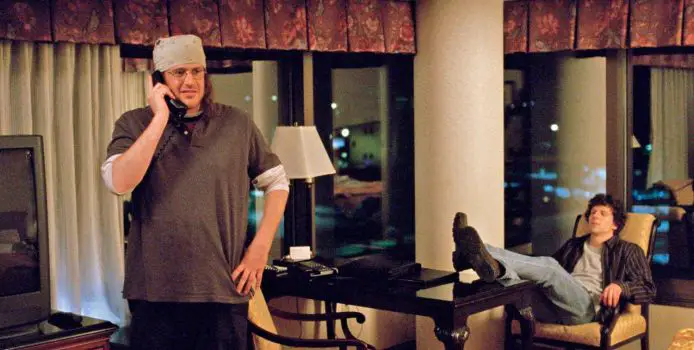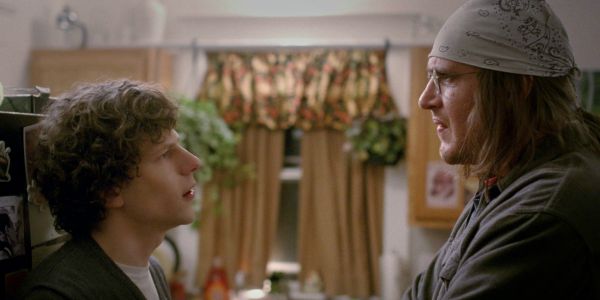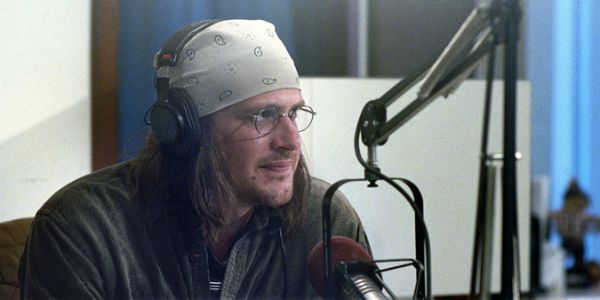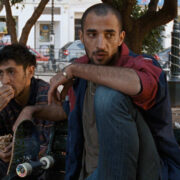THE END OF THE TOUR: A Road Movie For the Ages

I'm a recent graduate of Bard College, where I earned…
Among the final moments of The End of the Tour, author David Foster Wallace (Jason Segel) pulls his interviewer David Lipsky aside and says: “I don’t think you wanna be me.” Lipsky (Jesse Eisenberg) objects with the same how-could-you look I’ve returned incriminating but sensible remarks. He’s failed to conceal quasi-little-brotherly admiration for Wallace, and is frustrated by his revealing behavior and the circumstances that shape it. Lipsky is a writer while Wallace is, well, a much better writer; a quipster vs. a colossal humorist. He’s frustrated, in short, with the difference between himself and genius.
The End of the Tour, directed by James Ponsoldt, is a careful adaptation of Lipsky‘s 2010 book, “Although of Course You End Up Becoming Yourself“, a transcription of his five-day interview with Wallace. It takes place in the final week of Wallace‘s book tour, in 1996, promoting his second novel and magnum opus, “Infinite Jest”. The bare bones investigatory question of Lipsky‘s piece concerned Wallace‘s recent fame, how it felt to be “the most talked about writer in the country”—though dogged journalistic probing into Wallace‘s rumored drug addiction frequently compromises this motive in the film. Lipsky laid the article to rest when Rolling Stone cancelled the piece. In 2008, he resurrected their conversations after Wallace committed suicide in his Claremont, CA home.
Lipsky goes to Illinois
Though Wallace remains its focal point, The End of the Tour follows Lipsky, our window onto a week with Wallace and the conversations that emanate therefrom. It’s 1996, and Lipsky’s novel, “The Art Fair”, lacks readership. We see him give a reading to a near-empty bookstore. Later, he’ll perform a reading of “Although of Course…” for a packed house, in 2010. Ponsoldt invites us to consider Lipsky’s evolution, a writer let down by lukewarm public reception, to a writer who, 14 years later, knows that the death of a friend, a generational voice, partly constitutes his notoriety. And to futher consider what it is to be known for conveying someone else’s genius, not for one’s own trailblazing talents.

While Lipsky goes to work for Rolling Stone (provisionally, he suggests), Wallace’s “Infinite Jest” accumulates a level of New York buzz and critical acclaim on par with what J.D. Salinger’s “Nine Stories” unleashed in 1953. In a state of determined disbelief, Lipsky sits down with “Infinite Jest”, only to emerge determined to interview the man whose novel is really that good. He sets off with Rolling Stone’s all-clear and expense account to Wallace’s home in Bloomington, Illinois, where he’ll tag along to Minneapolis, Wallace’s final promotional stop. The dynamic of their growing acquaintance, by turns cautious, innocently transparent, and resentful, informs the rest of the film.
Not Your Usual Biopic
Ponsoldt is not motivated by the spirit of a traditional life-spanning biopic—likely to have a gravitas not unworthy of, but unwanted by Wallace if he were alive. No reenactments of traumatic, directionally revealing childhood events, no leaping temporal shifts. Lipsky’s arrival at Wallace’s Midwestern home defines the film’s actual trajectory, a conversation between two novelists with varying degrees of awkwardness and nervous laughter, false starts, male bonding, and frustration. In his book, Lipsky abridged his questions and interjections (severely, to the occasional point of incoherency) to better light its lead role. For the film, screenwriter Donald Margulies constricts their discussions’ scope while expanding—sensationally, at times—the dramatic dimensions of what in the book are almost imperceptible points of contention.
The End of the Tour‘s strength mirrors one of the book’s strengths. It contextualizes a decades-spanning author into one week. It is a thoughtful circumscription, not reduction, whereby confining Wallace somehow conditions his fullest representation. One of Ponsoldt‘s accomplishments is his willingness to stay the camera within Lipsky’s experience, not once guessing what Wallace does or says outside his interviewer’s company. The cinematic image, some film theorists say, effortlessly upends our ontological bearings, our would-be authentic relationships with objects and people as they are outside film’s persuasive influence. By maintaining his distance, Ponsoldt retains Wallace’s position within the realm of cultural and personal memory, prohibiting us, as far as he’s able, from expanding or infusing our image of Wallace with a purely cinematic reality.
Lipsky and Wallace
The End of the Tour attempts to extract the most cinematically plausible components of Lipsky’s transcription. Visually, Ponsoldt capably exposes the conflicts of interests implicit in Lipsky’s and Wallace’s interviewer-subject relationship. Wallace knows that journalists often make good opportunists, that it will be to the agenda of an article written outside his presence, control, and best interests that Lipsky will ultimately defer.
Lipsky wants to know what genius looks like, how it speaks, moves, lives, and why it wears a bandana. Yet, indeed, he’d like to turn this ineffable stuff of life and literature into hard journalistic cash back in New York—negotiable literary currency used to barter for more respect. “Writers,” insists Joan Didion, “are always selling somebody out.”

Lipsky’s journalistic impulses do get the better of him. He pressures Wallace to confess to a drug-addled past that largely never happened, and repeatedly suggests—at once wishfully and begrudgingly—that Wallace’s loneliness and uncertainty should disappear with the success of “Infinite Jest”. In these moments, Margulies‘ script wavers between appropriate embellishment and unfair misrepresentation, as Lipsky’s tactlessness borders on unbelievable.
Ponsoldt does what he can, transforming, in moments of strife, Lipsky’s and Wallace’s friendly proximity into hostile closeness, reminding us that The End of the Tour is a road movie about interpersonal, not geographical, distances. More still, it prefigures the essential strength of their developing friendship, that they feel invested enough to argue at all. They drive, talk, and eat, frequently departing into cornucopian stretches of Twizzlers, M&Ms, McDonalds, and cigarettes. As such, the film is driven by elements extremely Wallacian in spirit: the conversational, a life-as-lived candidness, and the extraneous but inspired observations of American culture one seems able to acquire only through the window of a moving car.
Segel as Wallace
Fans of Wallace were concerned with how Jason Segel, the hitherto comedic actor, would occupy the role of the writer, whose work and person fans feel unprecedentedly close to and in personal possession of. However, Segel‘s portrayal is soft, brilliant, and acutely observant of the man Wallace-heads have come to love through texts and interviews. In this film about fame and success in America, about a person who’s suspicious to the very core of one’s motives to attain it, and the empty treasure chest one finds at its end, Segel exudes a sadness with such precision that is, if not an identical representation of Wallace, a perfect accentuation of a story rooted deeply in Wallacian territory.

But Segel, whose ability to carefully weigh vulnerability and insecurity appears inexhaustible in The End of the Tour, is unable to embody the true expanse of opposing forces that often danced behind Wallace’s eyes as he spoke—which he did with seemingly effortless intellectual contortions. The result is that Segel conveys one historicized aspect of Wallace—that he was a really good guy—without conveying his violent self-reflexivity, the compulsion to turn in on himself, and the quiet dread of reaching a point of psychological no return.
David Foster Wallace
The End of the Tour is also the first film about the deceased writer, who wrote novella-length, exposé-ish essays with uproarious, eidetic depictions of slack-jawed American cultural phenomena: a cruise ship, the Illinois State Fair, the Maine Lobster Festival, and the Annual Adult Video News Awards. He wrote fiction with boundless prose and singular linguistic legerdemain. Through the use of protracted footnotes and endnotes, Wallace devised a model by which to reproduce the very fractured state of consciousness in our era, and wrote with exceedingly approachable erudition, occurring with all kinds of editorially frowned-upon usage: periphrases and signature polysyndetons, in combination with a euphony of popular and past slang; more importantly, the self-described “usage nerd” taught us what all these words mean.
Though perhaps what energizes readers most is his solemn, moral voice, not unlike our own, that resides in the gap between harsh, self-indulgent criticism of entertainment and the residual gut anguish of having to figure out how to be a good person within its spectacle. Wallace’s plaintive voice, quietly pleading without being moralistic, ensured his work transcended pure entertainment value.
Conclusion
With The End of the Tour, Ponsoldt ventures into dicey cinematic terrain—depicting the inner life of a writer always is. Yet he emerges gracefully and without harm to himself or its delicate subject. Though parts of Margulies‘ script demonstrate that cinema without spectacle is a contradiction in terms, he and Ponsoldt minimize filmgoing’s innate passivity by refusing to neatly conclude Lipsky’s and Wallace’s arguments, their giddy repartee, and their final moments together at Wallace’s house.
We’re as uncertain as Lipsky and Wallace of the relationship’s fate and its moment-to-moment standing for each of them. We’re forced to maintain a vigilant analysis of what’s happening. Which, as it turns out, is indispensable for a film whose plot is charted solely with conversation arcs and the silences therein. If fiction, according to Wallace, is “about what it is… to be a human being,” then The End of the Tour‘s life-as-lived approach to cinema does justice to the man and his work.
What did you think Jason Segel’s portrayal of David Foster Wallace?
The End of the Tour has gotten limited screening in American cinemas, and will be screened at the London Film Festival early next month. For all release dates, please check here.
(top image source: A24 Films)
Does content like this matter to you?
Become a Member and support film journalism. Unlock access to all of Film Inquiry`s great articles. Join a community of like-minded readers who are passionate about cinema - get access to our private members Network, give back to independent filmmakers, and more.
I'm a recent graduate of Bard College, where I earned a B.A. in French Studies. Film figured prominently in my final year, and I'm currently chasing that interest, reviewing, researching, watching, and loving.













